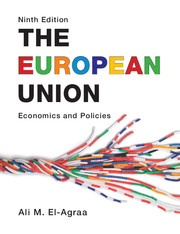Book contents
- Frontmatter
- Contents
- Figures
- Tables
- Boxes
- Contributors
- Preface
- A reader’s guide
- Abbreviations
- 1 General introduction
- Part I EU history, institutions and legal dimension
- Part II EU market integration
- Part III EU monetary integration
- Part IV The single European market
- 13 Competition policy
- 14 Industrial and competitiveness policy
- 15 Tax harmonization
- 16 Transport policy
- 17 Energy policy and energy markets
- 18 Environmental policy
- Part V EU budget and structural policies
- Part VI EU external relations
- Part VII The future of the EU
- Bibliography
- Author Index
- Index
- References
18 - Environmental policy
from Part IV - The single European market
- Frontmatter
- Contents
- Figures
- Tables
- Boxes
- Contributors
- Preface
- A reader’s guide
- Abbreviations
- 1 General introduction
- Part I EU history, institutions and legal dimension
- Part II EU market integration
- Part III EU monetary integration
- Part IV The single European market
- 13 Competition policy
- 14 Industrial and competitiveness policy
- 15 Tax harmonization
- 16 Transport policy
- 17 Energy policy and energy markets
- 18 Environmental policy
- Part V EU budget and structural policies
- Part VI EU external relations
- Part VII The future of the EU
- Bibliography
- Author Index
- Index
- References
Summary
Introduction
Concern about the state of the environment is not a new phenomenon. There have been attempts to address specific problems for generations, many of which involved dealing with public health issues, such as the need to improve the quality of the water system, but inevitably had an impact on the wider environment. Industrialization, population growth and the pace of urbanization had inevitable consequences for the state of the environment, with the health of populations suffering as a consequence. Neither of the two economic systems that emerged after the Second World War, communism and the free market, performed well in terms of environmental protection. The emphasis in the late 1940s and early 1950s was promoting recovery and material progress. There was no specific reference to environmental protection in the EEC Treaty of Rome. It was not until the inclusion of the environmental chapter in the Single European Act (SEA) in 1987 that the legal basis for an EU environmental policy was fully established.
The subsequent development of environmental policy was substantial, spurred by the accession of Austria, Finland and Sweden in 1995, which saw the EU embrace three states with a high-level commitment to environmental protection. However, the enlargements of 2004 and 2007 included ten Central and Eastern European countries (CEECs) with significant environmental problems. The scope and influence of the EU has grown at the same time as recognition that more needs to be done to protect the environment. The public believes that protecting the environment is an important issue, and therefore action in this area is likely to be popular and gain support for the EU. In a special Eurobarometer (2008) poll, 96 per cent of those asked across the EU27 said they thought that protecting the environment was important to them (64 per cent very important and 32 per cent fairly important). Also, 78 per cent thought that environmental problems had a direct effect on their daily life.
- Type
- Chapter
- Information
- The European UnionEconomics and Policies, pp. 270 - 286Publisher: Cambridge University PressPrint publication year: 2011



